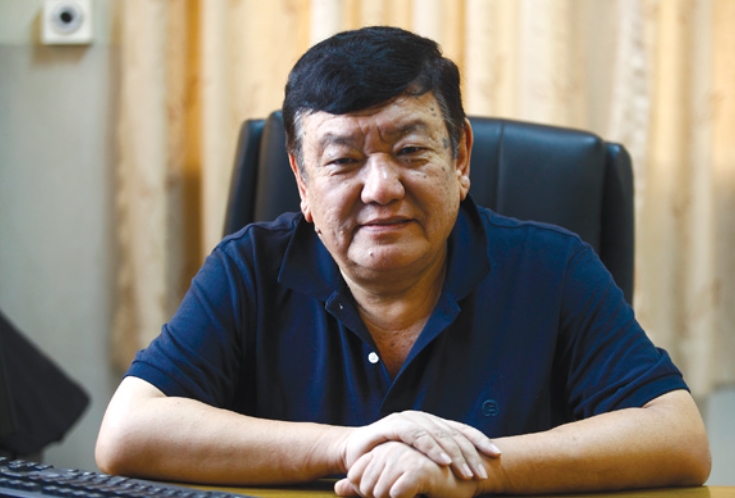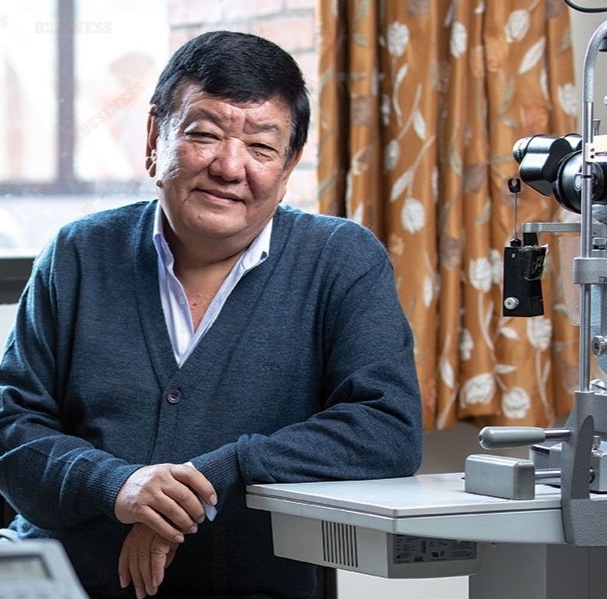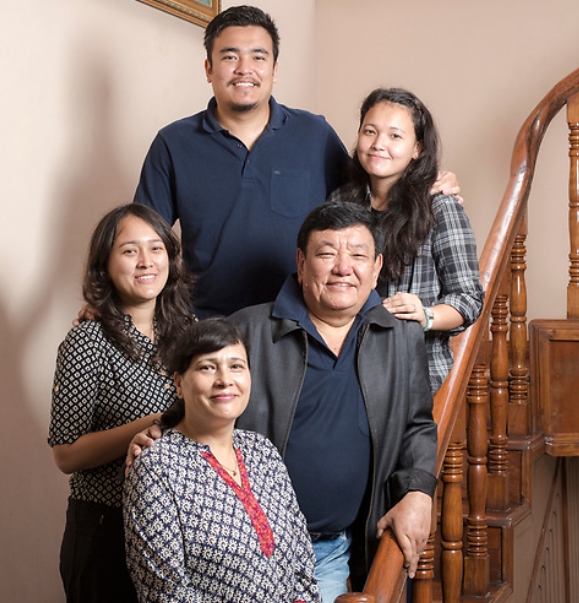

Sanduk Ruit is a renowned Nepalese ophthalmologist specializing in small-incision cataract surgery. With his remarkable skills, he has restored vision to more than 180,000 individuals in Africa and Asia. Ruit is the visionary behind the Tilganga Institute of Ophthalmology, where he serves as the founder and executive director. The institute manufactures affordable high-quality intraocular lenses, revolutionizing cataract surgeries by making them accessible to the world's most economically disadvantaged populations. Ruit's contributions have earned him the title of the "God of Sight" and prestigious recognitions such as the Ramon Magsaysay Award for Peace and International Understanding, often regarded as the Asian equivalent of the Nobel Prize. This honor acknowledges his dedication to advancing safe, effective, and cost-effective cataract surgery techniques, enabling the visually impaired in impoverished nations to regain their sight. Additionally, Ruit was awarded the Isa Award, the highest civilian honor in Bahrain, by the king of Bahrain for his groundbreaking work in developing sustainable and affordable methods to treat cataracts in the developing world, accompanied by a cash prize of 1 million dollars (approximately Rs 132 million).
Sanduk Ruit, a renowned Nepalese ophthalmologist, has restored sight to over 180,000 people in Africa and Asia through his expertise in small-incision cataract surgery. As the founder and executive director of the Tilganga Institute of Ophthalmology, he has revolutionized cataract surgeries by manufacturing affordable high-quality intraocular lenses, making them accessible to economically disadvantaged populations. Ruit's remarkable contributions have earned him the title of the "God of Sight" and prestigious accolades, including the Ramon Magsaysay Award and the Isa Award, recognizing his dedication to advancing safe, effective, and cost-effective cataract surgery techniques for the visually impaired in impoverished nations.
Born on September 4, 1954, in the remote mountainous village of Olangchunggola in northeast Nepal, Sanduk Ruit came into the world to humble parents, Sonam Ruit and Kesang Ruit. Set against the backdrop of the majestic Mt. Kanchenjunga, the village, situated 11,000 feet above sea level, comprised a mere 200 inhabitants. Isolated and devoid of modern amenities like electricity, schools, and healthcare facilities, the region remained buried under snow for six to nine months annually. Ruit's family relied on subsistence farming, small-scale trading, and livestock rearing for their livelihood. As the second of six siblings, he tragically lost three of them—his older brother to diarrhea at the tender age of three and his younger sister Chundak to fever at eight. However, it was the untimely death of his cherished companion, his younger sister Yangla, at 15 due to tuberculosis, that profoundly impacted Ruit. The family's impoverished state prevented them from affording the treatment that could have saved her life. This heartbreaking loss fueled Ruit's determination to become a doctor and serve underprivileged communities lacking access to adequate healthcare. He is Nepalese by nationality while his ethnicity is Nepalese-Asian.

The closest school to Ruit's village was a challenging fifteen-day journey in Darjeeling. At the age of seven, his father, a small-scale businessman, sent him to St Robert's School in Darjeeling, where he stayed for approximately four to five years, enduring the hardships of being away from his family and home. After some time, he returned to Nepal to pursue his education. In 1969, Ruit graduated from Siddhartha Vanasthali School in Kathmandu, Nepal, and later pursued further studies in India. With a scholarship, he studied Bachelor of Medicine and Bachelor of Surgery at King George's Medical College in Lucknow from 1972 to 1976. He then came back to Nepal and served as a General Physician at Bir Hospital in Kathmandu for three years. As he aspired to specialize in ophthalmology, Ruit resumed his studies in 1981 at the All India Institute of Medical Sciences in Delhi, where he obtained his Master's Degree with the help of a scholarship. After three years, in 1984, he returned to Nepal and dedicated eight years of his career to working at an eye hospital in Tripureshwor. During this time, Australian ophthalmologist Fred Hollows, who was in Nepal as a mentor under the World Health Organization, recognized Ruit's exceptional work and determination. In 1986, Hollows offered Ruit an opportunity to study cataract surgery in Australia. Ruit continued his studies in Australia, the Netherlands, and the United States, further expanding his expertise in the field.
During his time in Australia, Sanduk Ruit honed his expertise in the field of eye surgery. Collaborating with Fred Hollows, they pioneered a groundbreaking technique called Small Incision Cataract Surgery (SICS), which involved the use of intraocular lenses. Ruit holds the distinction of being the first Nepali doctor to employ intraocular lenses in his surgeries. Recognizing the need to make eye surgeries more affordable and accessible in Nepal, Ruit established the Nepal Eye Program Australia, later renamed The Fred Hollows Foundation. This initiative aimed to raise funds and support for providing comprehensive eye care services in Nepal. Despite being offered opportunities to stay and work in Australia, Ruit made the decision to return to Nepal and continue his invaluable work at the Tripureshwor Eye Hospital.
Ruit's commitment to improving eye health in Nepal and his collaboration with Fred Hollows have had a lasting impact. By introducing innovative surgical techniques and establishing organizations dedicated to eye care, Ruit has played a crucial role in transforming the landscape of ophthalmology in Nepal. His selfless dedication and passion for making eye surgeries more accessible have positively impacted the lives of countless individuals in need of vision care. Ruit's biography, The Barefoot Surgeon by Australian writer Ali Gripper, was published in June 2018. A Nepali translation of Sanduk Ruit was published by Fine Print Books in 2019.
Sanduk Ruit, a Nepalese ophthalmologist, is estimated to have a net worth of $5 million as of 2023. With his professional career, he earns a substantial annual salary in the thousands of dollars. Despite his significant earnings, Ruit maintains a modest lifestyle and expresses satisfaction with his income. The primary source of his wealth stems from his successful career as an ophthalmologist.
In 1987, Sanduk Ruit entered into matrimony with Nanda Shrestha, who is an ophthalmic nurse. Together, they have been partners in both their personal and professional lives, sharing a deep commitment to improving eye health in Nepal. Their union has been blessed with the joy of parenthood, as they are proud parents to one son and two daughters. While specific details about their family life are not available, it is evident that Ruit and Shrestha have built a strong foundation rooted in their shared dedication to the field of ophthalmology and their commitment to serving their community. As a team, Ruit and Shrestha have made significant contributions to the advancement of eye care and have worked tirelessly to enhance the well-being of individuals in Nepal and beyond. Their combined efforts, skills, and compassion have touched the lives of countless patients, as they continue to leave a lasting impact on the field of ophthalmology through their pioneering work and unwavering dedication. His sexual orientation is straight and he is not gay.

Sanduk Ruit possesses a handsome appearance, standing at a height of 1.65 meters (5 feet 5 inches) and weighing approximately 73 kilograms. He has taken good care of his physique, maintaining a well-proportioned and fit body. With his charming looks, Ruit is regarded as an attractive individual. He has black hair and captivating black eyes that complement his overall appearance. In terms of body type, he can be described as having an average build, showcasing a healthy physique that adds to his appealing personality.
The name Sanduk carries a significant and symbolic meaning as it is interpreted to signify "The Dragon in the Sky." This name encompasses both power and mystique, evoking imagery of a majestic creature soaring through the celestial realm. The dragon, a legendary creature in various cultures, represents strength, wisdom, and protection. By associating Sanduk's name with the dragon, it suggests that he possesses qualities of resilience, greatness, and a connection to higher realms. This profound meaning adds depth to Sanduk's identity, reflecting his potential and the impact he may have on the world. Just as the dragon captivates the imagination, Sanduk's name ignites curiosity and intrigue, embodying a sense of awe and wonder.
Sanduk has earned the title of the "doctor who saved 100,000 eyesight" due to his extraordinary achievements in the field of ophthalmology. Through his remarkable skills and relentless dedication, he has restored vision to a staggering number of individuals, making a profound impact on their lives. This accolade highlights the immense contributions he has made in preserving and improving eyesight, solidifying his reputation as a true savior in the realm of eye care. His remarkable accomplishments have not only transformed the lives of those he has treated but have also garnered widespread recognition and admiration for his exceptional expertise and unwavering commitment to the well-being of others.
Sanduk possesses a deep passion for both music and literature, finding immense joy and inspiration in these art forms. Music resonates with his soul, and he appreciates the power of melodies to evoke emotions and transport him to different realms. Whether it's listening to enchanting compositions or perhaps playing an instrument himself, music holds a special place in his heart. Similarly, he finds solace and enlightenment within the pages of books, immersing himself in captivating stories, thought-provoking ideas, and the vast knowledge that literature offers. Reading fuels his imagination broadens his perspective, and allows him to explore diverse worlds and perspectives. His love for music and reading reflects his insatiable curiosity, appreciation for beauty, and desire to continuously learn and grow.
For him, family is not just a cherished bond but also a constant source of inspiration and unwavering strength. They are the foundation upon which he builds his life, providing love, support, and guidance in both joyous and challenging times. Their unwavering presence and belief in him fuel his determination to overcome obstacles and pursue his dreams. He finds solace in their embrace, finding comfort and reassurance knowing that he is surrounded by their unwavering love and support. Their shared experiences, traditions, and values shape his identity and instill in him a profound sense of belonging. Their unwavering faith in his abilities and unwavering belief in his potential drive him to push his boundaries and reach for greater heights. He cherishes the moments spent together, creating lasting memories that serve as a reminder of the preciousness of family bonds. Ultimately, his family is his greatest source of inspiration, constantly reminding him of the importance of love, unity, and the power of a strong support system.
As a founding member of the Tilganga Institution of Ophthalmology, he played a pivotal role in establishing an esteemed institution dedicated to eye care and research. With a vision to improve the quality of eye healthcare, he actively contributed to the creation and development of this renowned institution. His passion and commitment to addressing visual impairments led him to be instrumental in shaping the organization's mission, values, and treatment methodologies. Through his involvement, the Tilganga Institution of Ophthalmology has become a beacon of hope for countless individuals seeking specialized eye care. His visionary leadership and unwavering dedication have propelled the institution to the forefront of ophthalmic advancements, making a lasting impact on the field of eye healthcare.